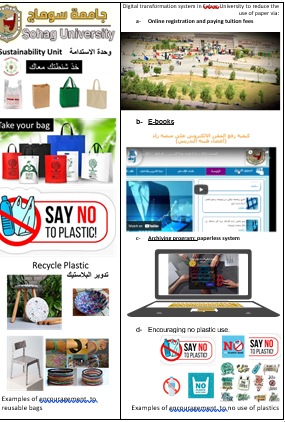Sustainability Initiatives
1-Carbon Footprint
It is an expression of carbon dioxide emissions resulting from the combustion of fuels in all its sources, which are represented in the consumption of electric energy and the emissions from various means of transportation
Sohag University has adopted several mechanisms to reduce carbon dioxide emissions and therefore reduce the carbon footprint:
1- Rationalizing electricity and water consumption.
2- Provide paths to encourage hiking and cycling.
3- Reducing the use of private cars inside the university and relying on mass/ public transportation.
4- Extending the use of energy from environmentally friendly sources.
5- Taking into consideration buying the highly effective types of devices
6- Adopting the green building policy upon renewing buildings or constructing new buildings.
7- Reducing, separating and recycling waste.
8- Preventing motorcycles from getting into the campus and provide them alternatives places outside the university.

2- Infrastructure and Green Cover


The university Campus, with its open spaces, green spaces, and its infrastructure, gives a key perception toward being eco- friendly
However, the university is seeking to provide more green areas.
The university is also concerned with safety and health and risk management and is working to promote the university’s emergency plan
However, the university is working to provide more green spaces and clean environmental factors in the framework of its adoption of sustainability standards, and this is clear from:
– The total area of the university is appropriate, including the area of buildings and the parking space for the numbers of students, faculty staff and employee.
The university is also concerned with occupational safety and health and risk management and is working to periodically update the university’s emergency plan
3- Water Management


Water management is defined as the process of planning, improving, and distributing the use of available water resources in order to achieve the best social, economic and environmental life for human beings.
The University’s Sustainability Unit is working with water management team to develop plans and mechanisms that contribute to rationalizing water consumption, reuse water after purification, and periodic maintenance plans for water conservation.
An example of rationalizing water consumption is the use of modern methods of irrigation on university farms.
The University’s Sustainability Unit is working with the water management team to develop plans and mechanisms that contribute to rationalizing water consumption, reuse water after purification, and periodic maintenance plans for water conservation.
An example of rationalizing water consumption is the
the use of modern methods of irrigation on university farms.
4-Energy Management


Sohag University has initiated the establishment of the Medical and Industrial Waste Management Unit (a unit of a special nature) aimed at sorting, treating and marketing regular, medical, industrial and agricultural waste and studying how to recycle it or upgrade recyclable waste, because of its health, economic and environmental returns within the university and outside.
Through the following:
- Treating and studying how to recycle or market medical, industrial and agricultural waste from university hospitals, research laboratories, workshops, laboratories and farms after making the appropriate treatment systems.
- Work to prohibit the use of plastic bags and replace them with others, such as paper bags or multiple-use that have the feature of biodegradation.
- Raise awareness and education on the importance of sorting waste from the source, for individuals and students by holding seminars and workshops on how to deal with all kinds of waste.
- Issuing informative brochures and publications in the field of dealing with all types of waste and issuing a magazine for the University of Sohag to publish environmental research and studies. (Environmental Research Bulletin)
sources, such as solar energy

5- Waste Management


Sohag University has initiated the establishment of the Medical and Industrial Waste Management Unit (a unit of a special nature) aimed at sorting, treating and marketing regular, medical, industrial and agricultural waste and studying how to recycle it or upgrade recyclable waste, because of its health, economic and environmental returns within the university and outside.
Through the following:
- Treating and studying how to recycle or market medical, industrial and agricultural waste from university hospitals, research laboratories, workshops, laboratories and farms after appropriate treatment systems have been performed.
- Work to prohibit the use of plastic bags and replace them with others, such as paper bags or multi-use that have the feature of biodegradation.
- Raise awareness and education on the importance of sorting waste from the source for individuals and students by holding seminars and workshops on how to deal with all kinds of waste.
- Issuing informative brochures and publications in the field of dealing with all types of waste and issuing a magazine for the University of Sohag to publish environmental research and studies. (Environmental Research Bulletin)
6- Transportation


Transport systems play an important role in carbon emissions and pollutant levels at universities.
Therefore, Sohag University was keen to take many policies to reduce the number of vehicles on campus, including:
1-The university has provided motorcycle parking spaces outside the campus to reduce pollution and carbon emissions on campus
2- Encourage pedestrian policy and the use of bicycles for university employees, staff members, students, and employees on campus, and avoid the use of private vehicles
3- Providing internal transportation within the university or for transportation to the new university headquarters in the new city of Sohag in order to reduce the use of private vehicles, while trying to provide and purchase electric vehicles on the university campus to transport university employees in order to reduce carbon emissions
4-Converting cars to work with natural gas, as 5 cars have been converted and we still have 11 cars in the process of being converted
All of this will eventually lead to the use of environmentally friendly transportation and reduce the carbon footprint within and around the campus.
7- Education and scientific research


Education and scientific research is considered one of the most important criteria in achieving development and sustainability in any developed or developing society.
From this standpoint, Sohag University has paid great attention to education and scientific research, and supported it with all its human and material capabilities, where:
- Sohag University held many conferences, symposia and scientific events that concerned with developing the human element inside and outside the university and achieving sustainability in developing human capabilities.
- The ratio of sustainability curricula comparing to the university total curricula is 30%.
- These curricula focus on achieving aspects of sustainability and appropriate employment of human and material resources in society
- The ratio of sustainability research and studies comparing to research published of University faculties is 35% during the previous three years.
The aim of these researches papers is to providing the society with
- Sohag University offers many incentives rewards to researchers for their published research in internationally recognized scientific journals.
Sohag University also provides training courses for capacity development for the various categories of university employees, including staff members and their assistants, administrative cadres and all human elements at the university.
- Sohag University encouraged the formation of dozens of Student entities who were interested in developing the capabilities of university students and polishing the skills of cooperation among them, thus achieving the criterion of sustainability in developing the capabilities of students culturally and socially.



